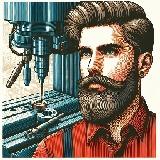Gantry and Gmoccapy
- Ingo
-
 Topic Author
Topic Author
- Offline
- Premium Member
-

Less
More
- Posts: 113
- Thank you received: 2
05 Jul 2022 01:45 #246625
by Ingo
Gantry and Gmoccapy was created by Ingo
Hello guys,
I'm going to start a machine project in which I will have two sets of servo and motor drivers on one axis (X,YY,Z). I intend to use the Gmoccapy interface and the Mesa 7i76E board hardware part. I've never built a Gantry machine and I would like to understand the correct way to do it, I have a question. The hardware part do I use pulse and direction signals in parallel together on the same axis (in my case Y axis), or on different X(0), Y(1), Z(2) and Y2(3) axes? And the software part I create a normal machine in three axes then I add another joint, or if I connect the physical part of pulse and direction together (in parallel) the same axis as the Y (1) I don't need it.
Could someone enlighten me.
Tks
Ingo
I'm going to start a machine project in which I will have two sets of servo and motor drivers on one axis (X,YY,Z). I intend to use the Gmoccapy interface and the Mesa 7i76E board hardware part. I've never built a Gantry machine and I would like to understand the correct way to do it, I have a question. The hardware part do I use pulse and direction signals in parallel together on the same axis (in my case Y axis), or on different X(0), Y(1), Z(2) and Y2(3) axes? And the software part I create a normal machine in three axes then I add another joint, or if I connect the physical part of pulse and direction together (in parallel) the same axis as the Y (1) I don't need it.
Could someone enlighten me.
Tks
Ingo
Please Log in or Create an account to join the conversation.
- GuiHue
-

- Offline
- Premium Member
-

Less
More
- Posts: 111
- Thank you received: 39
05 Jul 2022 06:59 #246629
by GuiHue
Replied by GuiHue on topic Gantry and Gmoccapy
Hi Ingo,
thanks to the abstraction concept of LinuxCNC, the GUI is independent of the axis configuration. Using 2.8.2 you want to set up each axis as an individual joint, with the Y axis having two joints. Personally, I prefer to call them X (Joint0), Y1 (Joint1), Y2 (Joint2), Z (Joint3). The reason you want this is to benefit from gantry squaring using home offsets.
I run a gmoccapy 2.8.2 setup with a 7i76e and YXXZ(A) config. The config is reasonably documented and available here:
github.com/GuiHue/kondor/
thanks to the abstraction concept of LinuxCNC, the GUI is independent of the axis configuration. Using 2.8.2 you want to set up each axis as an individual joint, with the Y axis having two joints. Personally, I prefer to call them X (Joint0), Y1 (Joint1), Y2 (Joint2), Z (Joint3). The reason you want this is to benefit from gantry squaring using home offsets.
I run a gmoccapy 2.8.2 setup with a 7i76e and YXXZ(A) config. The config is reasonably documented and available here:
github.com/GuiHue/kondor/
Please Log in or Create an account to join the conversation.
- Ingo
-
 Topic Author
Topic Author
- Offline
- Premium Member
-

Less
More
- Posts: 113
- Thank you received: 2
05 Jul 2022 23:38 #246685
by Ingo
Replied by Ingo on topic Gantry and Gmoccapy
thank you very much, i will study
Please Log in or Create an account to join the conversation.
- Ingo
-
 Topic Author
Topic Author
- Offline
- Premium Member
-

Less
More
- Posts: 113
- Thank you received: 2
22 Jul 2022 14:27 #248034
by Ingo
Replied by Ingo on topic Gantry and Gmoccapy
Hello,
I managed to create XYYZ machine, I have a doubt in the home of the YY axis (tandem). Do I need to have the physical reference switch for each axis, or one for both axes?
I managed to create XYYZ machine, I have a doubt in the home of the YY axis (tandem). Do I need to have the physical reference switch for each axis, or one for both axes?
Please Log in or Create an account to join the conversation.
- rodw
-

- Offline
- Platinum Member
-

Less
More
- Posts: 11501
- Thank you received: 3857
23 Jul 2022 13:04 #248117
by rodw
Replied by rodw on topic Gantry and Gmoccapy
each joint needs its own home switch and it must stay triggered to end of travel.
Please Log in or Create an account to join the conversation.
Time to create page: 0.199 seconds
